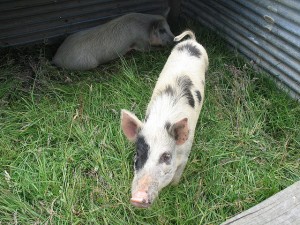By Julie Murphree, Arizona Farm Bureau
Come on. If the group has to use undercover videos, you know they’re yanking your chain.
The animal advocacy group, Mercy for Animals, has created a new 12-minute video titled “Farm to Fridge” that uses undercover footage showing alleged animal mistreatment on farms.
This week, Mercy for Animals began a national tour of the film in 40 cities. The tour features a custom-built truck fitted with 80-inch TV screens, speakers and billboard-sized banners, asking, “How much cruelty can you swallow?” Pretty clever title, but again, they’re yanking your chain.
Organizers say the tour is aimed at raising awareness of the plights of pigs, hens and calves confined in “factory farms.” During the day, the truck will circle city centers, parking for educational outreach events and then conclude in the evenings with screenings of the “Farm to Fridge” documentary. This standard statement, then, leaves the impression that as a whole animal agriculture abuses animals. This is simply not true.
The Farm to Fridge tour works on our emotions. No decent and respecting human being would abuse animals. Those that do are deranged. You know that I know that, groups like Mercy for Animals are trying to make it seem like such deranged practices are the norm in animal agriculture.
Film projects like this are designed to play on our emotions and yank our chains. I use this idiom because it’s appropriate.
I’ve visited too many large animal operations (factory farms) in Arizona and other states to know that the common practices in animal agriculture the best management practices are to treat our animals humanely.
Arizona’s farmers and ranchers take any claim about animal mistreatment very seriously, especially those that manage large animal operations. Their standard industry practices always list that any evidence of animal abuse should be taken to the appropriate state and local authorities whose job it is to investigate those claims. These practices are in place and you can typically see them posted on signage in English and Spanish for workers to read and apply if necessary.
The treatment, health and well-being of farm animals are of utmost importance to farmers and ranchers from small, medium and large operations. Proper animal care leads to production of high-quality milk, meat and eggs.
The farmers and ranchers I know are committed to providing high-quality, healthy food products such as milk, meat and eggs. They know that healthy animals result in healthy food for consumers and that starts with top-notch animal care.
On a more personal note, they typically get attached to their animals, even when managing hundreds and even thousands of them.
Nutritious diets, healthy living conditions and good medical care are among the many animal welfare practices routinely used by farmers and ranchers. This is standard.
And if anyone wonders if this is across the board, not just in Arizona, American Farm Bureau Federation’s Conversations on Care website contains information about how the vast majority of farmers and ranchers care for their animals.
Animal agriculture in the United States is so serious about humane treatment of animals, the industry has Quality Assurance programs at the national and state levels that provide farmers and ranchers with guidelines for the production of safe, wholesome animals, including recommendations on necessary animal handling and facilities.
But you won’t hear about any of this from Mercy for Animals.
Standards for animal care should be based on the expertise of veterinarians, farmers, ranchers and animal scientists—the people who work with farm animals daily but Mercy for Animals will yank our chains, play on our emotions and try to sway a public without any consideration for the years of expertise and care put into our modern animal agriculture practices.
Below is what I’ve read about how undercover videos are made (my sources being United States Department of Agriculture investigations and others):
- Videos are made to look dark and foreboding on purpose to discourage and scare people and yank our chain.
- Those that take the videos are often hired under false pretense to work for an animal operation with the intent to take bad video and have even abused the animals themselves to obtain the video and/or agitated co-workers into doing abusive things.
- Often the video takers don’t immediately report the abuse then its released months later. Such strategies cause me to question their true motives of humane animal treatment.
- Also, some of the video has been proven to be taken outside of the United States in other countries … countries that don’t have the same animal care standards.
If an animal facility is proven to abuse animal it should be shut down, everyone in agriculture agrees. But to present animal agriculture in a way that suggests animal abuse is common practices is simply to defy common sense and to suggest that the agriculture industry is full of deranged and cruel people.
The reality is that such animal activists groups who have a mission to convert us to vegetarians and must use scare tactics to get us there are simply yanking our chain.
Related articles
- Facts About Pork Production in the US
- Video: What is a Factory Farm or a Mega Farm?
- Video: Caring for Our Animals, Ranching in Arizona


